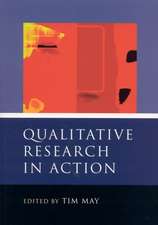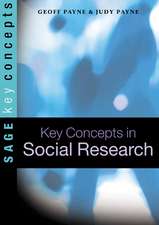Researching Health Needs: A Community-Based Approach
Autor Judy Payneen Limba Engleză Paperback – 26 oct 1999
'The overall style and presentation of the book is good with useful figures, chapter summaries, self-assessment exercises and case studies. The book is well-organised with logical progression through the stages of health related social research. Complex issues are described with clarity and explored in relation to actual examples that should enhance their accessibility for inexperienced researchers. The style of the book lends itself to use as a reference book and this allows it to be used over an extended time period by individuals, as their interest or experience grows'
- Physiotherapy
Researching Health Needs is an easy to use introductory guide to the main social research techniques used to gather evidence about the health needs of local communities.
The reader is taken through the process of producing evidence, from the initial planning stages of research, to writing up, getting the message across, and trying to influence policy and practice. All of the methods are described in a simple and, as far as possible, non-technical way, and are extensively illustrated with concrete examples from existing studies.
The author has adopted a comprehensive, and at times imaginative, approach to applied social research. Key features of the text include: coverage of both social survey methods and qualitative approaches; review of methods for investigating health status and community profiling, along with longitudinal and evaluative studies; a selection on using the Internet to access information, with details of relevant international and UKwebsites; inclusion of visual techniques for collecting data, along with guidelines for incorporating these into mixed-methods studies; extensive use of case studies; and practical exercises at the end of each methods chapter.
| Toate formatele și edițiile | Preț | Express |
|---|---|---|
| Paperback (1) | 568.29 lei 6-8 săpt. | |
| SAGE Publications – 26 oct 1999 | 568.29 lei 6-8 săpt. | |
| Hardback (1) | 1595.45 lei 6-8 săpt. | |
| SAGE Publications – 31 oct 1999 | 1595.45 lei 6-8 săpt. |
Preț: 568.29 lei
Preț vechi: 598.21 lei
-5% Nou
Puncte Express: 852
Preț estimativ în valută:
108.78€ • 118.20$ • 91.43£
108.78€ • 118.20$ • 91.43£
Carte tipărită la comandă
Livrare economică 21 aprilie-05 mai
Preluare comenzi: 021 569.72.76
Specificații
ISBN-13: 9780761960843
ISBN-10: 0761960848
Pagini: 208
Dimensiuni: 156 x 234 x 13 mm
Greutate: 0.36 kg
Ediția:1
Editura: SAGE Publications
Colecția Sage Publications Ltd
Locul publicării:London, United Kingdom
ISBN-10: 0761960848
Pagini: 208
Dimensiuni: 156 x 234 x 13 mm
Greutate: 0.36 kg
Ediția:1
Editura: SAGE Publications
Colecția Sage Publications Ltd
Locul publicării:London, United Kingdom
Recenzii
`[It is] difficult to find a single volume that addresses the specific range of methodological challenges [in] health needs assessment… Judy Payne's book is a very welcome answer to this problem. [This book] offers a lucid d logical exposition of the research process. It begins with a short introduction to the relevant policy context and a clarification of the terms `health', `need' and `community'. The following chapters cover the planning stage of a project… The book then moves on to the empirical stage of research… The volume concludes with a number of short case studies…It uses research terminology judiciously, providing clear explanations and illustrations. A useful selection of references to additional texts is also given. [T]he identification of a range of typical problems associated with the interpretation of official statistics will help would-be investigators to avoid drawing wrong conclusions about the health status of different groups. There is a useful and succinct description of a number of deprivation indices, together with relevant references. The sections on sampling strategies and the analysis of statistical data are particularly good in terms of coverage, clarity and explanation of technical terms. [As an all round `use-friendly' text, the book achieves its aim admirably. It presents a clear guide while at the same time conveying the challenges and possible pitfalls inherent in investigative research work. This book provides an invaluable resource for anyone planning to undertake needs assessment in the fields of health, community or social care. It also offers an excellent basic text on health and social research for undergraduate and postgraduate students' - Sociology
'The overall style and presentation of the book is good with useful figures, chapter summaries, self-assessment exercises and case studies. The book is well-organised with logical progression through the stages of health related social research. Complex issues are described with clarity and explored in relation to actual examples that should enhance their accessibility for inexperienced researchers. The style of the book lends itself to use as a reference book and this allows it to be used over an extended time period by individuals, as their interest or experience grows'
- Physiotherapy
'The overall style and presentation of the book is good with useful figures, chapter summaries, self-assessment exercises and case studies. The book is well-organised with logical progression through the stages of health related social research. Complex issues are described with clarity and explored in relation to actual examples that should enhance their accessibility for inexperienced researchers. The style of the book lends itself to use as a reference book and this allows it to be used over an extended time period by individuals, as their interest or experience grows'
- Physiotherapy
Cuprins
Introduction
Introduction
Planning Your Project
Collecting Information
Using Existing Information
Selecting Respondents
Asking Questions
Observational Techniques
Existing Procedures and Evaluations
The Processing and Analysis of Quantitative Data
The Processing and Analysis of Qualitative Data
Presenting the Evidence
Introduction
Planning Your Project
Collecting Information
Using Existing Information
Selecting Respondents
Asking Questions
Observational Techniques
Existing Procedures and Evaluations
The Processing and Analysis of Quantitative Data
The Processing and Analysis of Qualitative Data
Presenting the Evidence
Notă biografică
Descriere
Researching Health Needs provides a practical, easy to use introductory guide to the main social science research techniques used in gathering evidence about the health needs of local communities. Assessing health needs is part of the evidence-based approach to planning that is now central to practice in health professions, such as community nursing, social care, community work and public health.
The book guides the reader through the process of producing evidence about health needs, from the initial planning stages of research to writing up, getting the message across, and trying to influence policy and practice. All of the methods are described in a simple and, as far as possible, non-technical way, and are extensively illustrated by concrete examples from exisiting studies.
This practical guide to assessing health needs provides a comprehensive, and at times imaginative, approach to applied social research. Key features of the text include: coverage of both social survey methods and qualitative approaches; a review of methods for investigating health status and community profiling, along with longitudinal and evaluative studies; a section on using the internet to access information, with details of relevant international and UK websites; inclusion of visual techniques for collecting data, along with guidelines for incorporating these into mixed-methods studies; extensive use of case studies; and practical exercises at the end of each methods chapter.
This accessible and practical introduction to applied social research will be an essential text for undergraduate and post-qualification students in health, community work, and social care. It will also be an invaluable tool for practicing professionals in these fields.
This practical guide to assessing health needs provides a comprehensive, and at times imaginative, approach to applied social research. Key features of the text include: coverage of both social survey methods and qualitative approaches; a review of methods for investigating health status and community profiling, along with longitudinal and evaluative studies; a section on using the internet to access information, with details of relevant international and UK websites; inclusion of visual techniques for collecting data, along with guidelines for incorporating these into mixed-methods studies; extensive use of case studies; and practical exercises at the end of each methods chapter.
This accessible and practical introduction to applied social research will be an essential text for undergraduate and post-qualification students in health, community work, and social care. It will also be an invaluable tool for practicing professionals in these fields.









